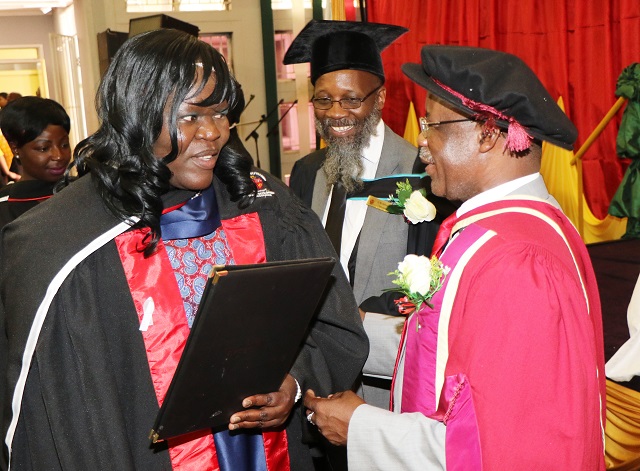‘Vocational training key to socio-economic growth’


Ministry of Higher and Tertiary Education Permanent Secretary Professor Francis Gudyanga presents an ECD Diploma to Agnes Hadzizi while Bulawayo Polytechnic Principal, Engineer Gilbert Mabasa looks on during a graduation ceremony on Friday
Oliver Kazunga, Senior Business Reporter
The Government should invest more in Vocational Education Training (VET) to promote sustainable socio-economic growth across all sectors, a senior official has said.
Permanent Secretary in the Ministry of Higher and Tertiary Education, Science and Technology Development Professor Francis Gudyanga said this at Bulawayo Polytechnic College’s Third Skills Development Graduation and Prize Giving Ceremony on Friday.
A total of 476 graduates from various divisions such as adult and continuing education, automotive engineering, applied science and technology, commerce and civil engineering were conferred with certificates and diplomas.
Prof Gudyanga, who was the guest of honour, said VET comprises formal, non-formal and informal learning for world class work.
“Young people, men and women learn knowledge and skills from basic to advanced levels across a wide range of institutional and work settings and in diverse socio-economic contexts.
“The third Bulawayo Polytechnic Skills Development Graduation Ceremony takes place at a very important time,” he said.
“Zimbabwe is confronting a crisis in youth employment and VET is key to better prepare young people for a productive life and to promote a transformative and sustained economic growth,” he said.
Prof Gudyanga said it was a fact that investment flows and innovation thrive in places where the best talent resides.
To be successful, he said, growth and development strategies should be strongly based on human capital development.
“To keep up the speed of technical change and the changes in global value chains, the Government needs to invest across the entire system that builds workforce skills. In the long-run, skills development is transformational for both social and economic growth.
“Skills development not only helps countries and workers overcome the impact of the great recession, but also prepares them to face the long-term game-changing trends that are hitting the labour markets around the world,” said the Permanent Secretary.
Prof Gudyanga noted that VET was a key element in addressing issues of the great recession as well as demographic and technological changes.
“And VET is a key element for workers and companies to adjust to these game-changing trends and benefit from them. In this sense, investment in VET is a transformational policy for sustainable economic growth.
“We have learned about the transformational potential of education and skills development from the successful strategies in some of the Asian countries like Taiwan, Singapore, Malaysia, the Republic of Korea and China,” he said.
Prof Gudyanga said skills development can be holistic combining and participatory combining research, education and community organisation to develop grassroots strategies for real economic change.
Bulawayo Polytechnic skills development programme includes courses such as early childhood development, interior and events decoration, pattern making and garment construction, hair and beauty therapy, small-livestock production, carpentry and joinery, among others.
Earlier on, Bulawayo Polytechnic principal Engineer Gilbert Mabasa commended the graduands for equipping themselves with skills development that have potential to transform their lives.
He said his institution believed it was critical to forge and develop strong partnerships with various stakeholders in training and education to meet the present skills demand and address socio-economic needs for transformative and sustainable economic growth.
@okazunga











Comments